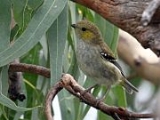
Forty-spotted Pardalote
Encyclopedia
The Forty-spotted Pardalote (Pardalotus quadragintus) is one of Australia's rarest birds and by far the rarest pardalote
, being confined to the south-east corner of Tasmania
.
(Pardalotus punctatus), but has a dull greenish-brown back and head, compared to the more colourful plumage of the former, with which it shares its range, and there is no brow line. The rump is olive, the under-tail dull yellow. The chest is white with light yellow tints. The wings are black with white tips, appearing as many (closer to 60 than 40) discrete dots when the wings are folded. There is no seasonal variation in plumage; juveniles are slightly less colourful than the adults.
and southern Bruny Island. It is occasionally reported from the suburbs of Hobart
. Sedentary or locally nomadic over its restricted range, it is declining in numbers and listed as endangered. It is most successful on Maria Island, which is managed as a refuge, with introduced predators having been eliminated.
s.
Pardalote
Pardalotes or peep-wrens are a family, Pardalotidae, of very small, brightly coloured birds native to Australia, with short tails, strong legs, and stubby blunt beaks. This family is composed of four species in one genus, Pardalotus, and several subspecies. The name derives from a Greek word...
, being confined to the south-east corner of Tasmania
Tasmania
Tasmania is an Australian island and state. It is south of the continent, separated by Bass Strait. The state includes the island of Tasmania—the 26th largest island in the world—and the surrounding islands. The state has a population of 507,626 , of whom almost half reside in the greater Hobart...
.
Description
A small, energetic passerine about 9 to 10 cm (3½-4 in) long, the Forty-spot is similar to the much commoner Spotted PardaloteSpotted Pardalote
The Spotted Pardalote is one of the smallest of all Australian birds at 8 to 10 cm in length, and one of the most colourful; it is sometimes known as the Diamondbird...
(Pardalotus punctatus), but has a dull greenish-brown back and head, compared to the more colourful plumage of the former, with which it shares its range, and there is no brow line. The rump is olive, the under-tail dull yellow. The chest is white with light yellow tints. The wings are black with white tips, appearing as many (closer to 60 than 40) discrete dots when the wings are folded. There is no seasonal variation in plumage; juveniles are slightly less colourful than the adults.
Distribution
Now found reliably only in a few isolated colonies on south-eastern Tasmania, most notably on Maria IslandMaria Island
Maria Island is a mountainous island off the east coast of Tasmania. The entire island is a national park. Maria Island National Park has a total area of 115.50 km², which includes a marine area of 18.78 km² off the island's northwest coast. The island is about 20 km in length from...
and southern Bruny Island. It is occasionally reported from the suburbs of Hobart
Hobart
Hobart is the state capital and most populous city of the Australian island state of Tasmania. Founded in 1804 as a penal colony,Hobart is Australia's second oldest capital city after Sydney. In 2009, the city had a greater area population of approximately 212,019. A resident of Hobart is known as...
. Sedentary or locally nomadic over its restricted range, it is declining in numbers and listed as endangered. It is most successful on Maria Island, which is managed as a refuge, with introduced predators having been eliminated.
Habitat
Relatively dry Eucalypt forests with high concentration of the Manna Gum, where it forages almost exclusively.Behaviour
Usually in pairs or small flocks, the pardalotes forage methodically for small insects. They nest in tree hollowTree hollow
A tree hollow or tree hole is a semi-enclosed cavity which has naturally formed in the trunk or branch of a tree. These are predominantly found in old trees, whether living or not...
s.

